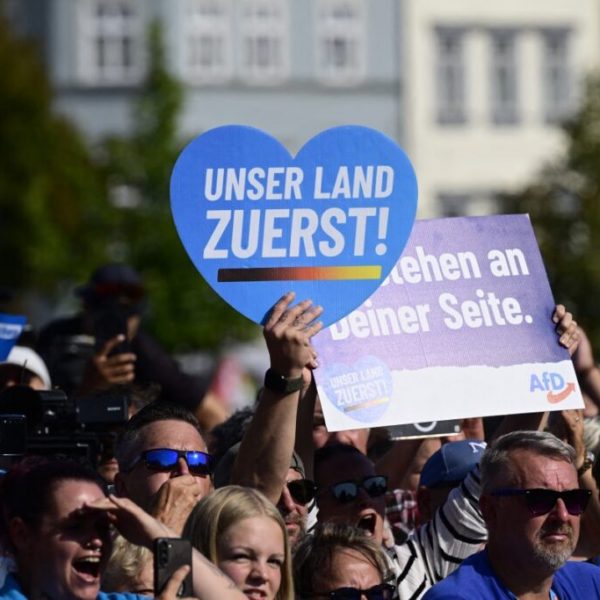
Voters care more about their families, homes, and the consequences of uncontrolled immigration than about what the elites think of them.
Anti-globalist nationalist-populist parties from the Right (AfD) and the Left (BSW) cleaned up in Germany's regional elections in Thuringia and Saxony on Sunday, reflecting the discontent voters feel towards the current center-left governing parties. The results are a significant milestone in the ongoing struggle between Germany's ruling elites and the people-something that is playing out in similar ways across the Continent.
While the media would like to characterize these elections along Right/Left-or East/West-lines, the truth is that these elections reflect the divide between the elites and ordinary people.
As if on cue, as soon as exit polls indicated favorable results for the Alternative for Germany (AfD), media around the world resorted to predictably alarmist language-with many outlets reporting that this was the first "hard right" or "far right" regional electoral victory in Germany "since WWII." As if reading from talking points, other media followed suit:
- The Times said the AfD is "widely regarded as the first hard-right nationalist party to win a regional state election since Nazi rule."
- Le Monde: "En Allemagne, l'extrême droite remporte pour la première fois depuis l'après-guerre un scrutin régional, en Thuringe" (In Germany, the extreme right wins a regional election for the first time since the post-war period, in Thuringia)
- And Newsweek crudely titled a story: "AfD Makes German Election History 85 Years After Nazis Started World War II."
Not to be bested, Politico's Brussels Playbook ominously noted:
GERMANY SHAKEN AS FAR RIGHT SURGES IN STATE ELECTIONS: Seventy-nine years since World War II came to an end in Europe, the anti-immigrant Alternative for Germany (AfD) surged during two state elections held over the weekend in eastern Germany.
The editor-in-chief of German public broadcaster ZDF, Bettina Schausten, was far less sober in her post-election analysis, outrageously comparing AfD's election victory with the attack on Poland by the Wehrmacht on September 1, 1939.
The hysteria didn't stop with the media. The usual suspects from the political class also weighed in. Barely a few hours after the election results were announced, Chancellor Olaf Scholz issued a public statement, describing the outcome as "bitter" and calling on parties in Saxony and Thuringia to forge alliances-without the AfD.
"All democratic parties are now called upon to form stable governments without right-wing extremists," Scholz told Reuters on Monday. "Our country cannot and must not get used to this. The AfD is damaging Germany. It is weakening the economy, dividing society and ruining our country's reputation."
Germany's political elites are already maneuvering and re-positioning to avoid an alliance with the AfD at all costs. This is, of course, a tried-and-true tactic of the morally bankrupt political establishment: establishing a cordon sanitaire around any party deemed unacceptable by those already in power.
According to Scholz and his ilk, elections are only ever truly democratic and fair if the political elites approve of the outcomes-the people's votes be damned. But that is not democracy. That is the tyranny of the powerful. And it keeps in power the very people who are to blame for Germany's weakened economy, divided society, and tarnished reputation.
And with the collusion of the mainstream media, they are portraying the AfD and its voters as a sinister force that threatens freedom and democracy-as if the mere fact that citizens are thinking for themselves were somehow antidemocratic.
When our political leaders have this outright disdain for such parties and the people they represent, it is time elect new leaders. Sunday's voters in Thuringia and Saxony did just this. They told Scholz and others that they had finally had enough-enough of their country's decline and enough of the mushy middle.
Voters want leaders who are willing to really turn things around-by focusing on economic growth, and putting an end to crime and uncontrolled immigration. And such sentiments can be found not just in Germany. There is clear popular support for the nationalist-populist Right across Europe.
Europe's establishment and legacy parties know this-which is why their knee-jerk reaction is not self-reflection but the hasty erection of a cordon sanitaire around such parties-and attempts to discredit voters.
European Commission president Ursula von der Leyen once arrogantly claimed that sovereigntist parties in the European Parliament were 'anti-democratic' and spoke only for an ignorant minority (ironic for someone from the European People's Party). The same elitist rhetoric was used against Brexiteers.
Sunday's voters don't care about such name-calling. They care more about their families, homes, and regions-and the very real consequences of uncontrolled immigration on public safety.
Perhaps von der Leyen and Scholz would do well to actually listen to Björn Höcke, AfD's Thuringia leader, who told broadcaster ARD: "We are ready to take on government responsibility. We are the number one people's party in Thuringia. The old parties should practice humility."
The same message should be heeded by neighboring Austria's political establishment. On September 29th, that country will have their national elections-and the mainstream parties are already running scared, with the nationalist-populist Austrian Freedom Party (FPÖ) predicted to clean up in the election.
The Austrian People's Party (ÖVP)-an ostensibly center-right party but really part of the mushy middle-sees the handwriting on the wall, and has unconvincingly proclaimed: "We need more of the center!" With public sentiment in Austria saying exactly the opposite, that party now faces a stunning defeat at the polls. Voters in Austria will likely follow the examples of Thuringia and Saxony-and vote the old parties out. They, along with voters across Europe, are finally saying "Enough is enough!"
Original article: europeanconservative.com